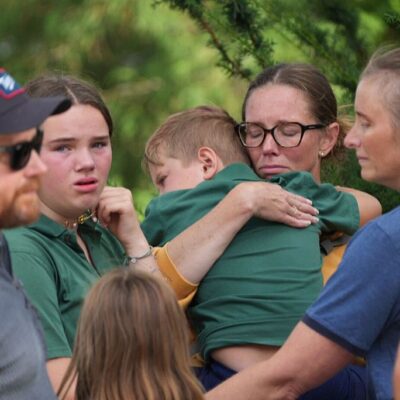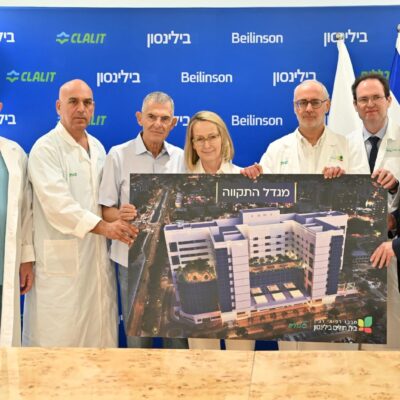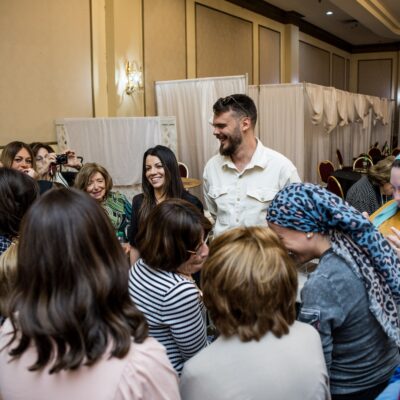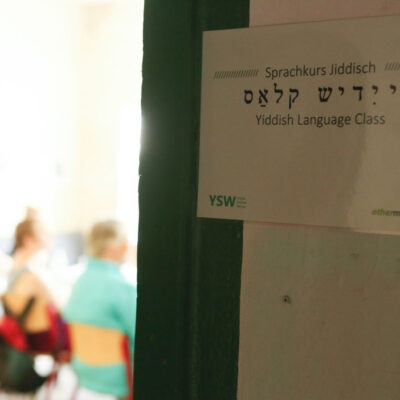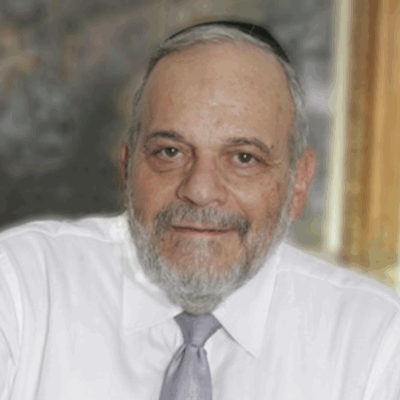Your Daily Phil: The Big Duck fallout + Interview with Russell Berrie’s outgoing CEO
Good Wednesday morning!
The Shalom Hartman Institute responded on Tuesday evening to a report earlier in the day that Big Duck, a New York-based consulting firm that has worked with a number of Jewish organizations, refused to work with the institute due to its presence in Israel and opposition to the Boycott, Divestment and Sanctions movement.
“Big Duck’s decision represents a moving of the goalposts on BDS from Israel to North American Jewish organizations, and applies a standard on North American Jewish commitments that would exclude the vast majority of the members of our community,” the statement said. “Big Duck’s claims to not apply litmus tests nor to adhere to a BDS policy as a company are belied by their application of a litmus test here, and by their allowing those employees who support BDS to exercise a veto over business decisions on the basis of that commitment.”
eJP reached out to the Jewish organizations that work or have worked with Big Duck. The Jewish Board and National Council for Jewish Women declined to comment on the matter, while the Jewish Theological Seminary told eJP that it “is speaking directly with Big Duck to fully understand the circumstances mentioned in the JTA story and will be evaluating the situation in order to determine an appropriate response.”
Keshet and Marlene Meyerson JCC Manhattan did not respond to requests for comment.
EXIT INTERVIEW
Berrie Foundation’s outgoing CEO Ruth Salzman looks back

Russell Berrie Foundation
When Ruth Salzman took over as CEO of the Russell Berrie Foundation 13 years ago, it was something of a homegrown operation. The New Jersey-based foundation, which focuses on diabetes care and research and regional economic development in Israel, was “a mom-and-pop shop where the trustees met every other week to review applications,” Idana Goldberg, the foundation’s former chief program officer, explained to eJewishPhilanthropy’s Esther Kustanowitz. Salzman, Goldberg said, transformed the organization, professionalizing it, increasing its grants and pushing it to “partner with grantees” and spur new projects.
Diabetes SPHERE: During Salzman’s tenure she also spearheaded the organization’s most ambitious project, The Russell Berrie Galilee Diabetes SPHERE (or Social Precision-medicine Health Equity Research Endeavor), a comprehensive diabetes prevention effort in Israel’s healthcare-starved Galilee region. “[SPHERE] was a way to bring our knowledge and depth about the Galil and about regional development together with our appreciation and understanding on healthcare issues and specifically diabetes,” Salzman told eJP. The foundation’s cornerstone investment of $20 million — its largest-ever gift — jump-starts what is envisioned as a 10-year, $75 million program.
More than philanthropy: Goldberg has succeeded Salzman as CEO. She told eJP that her predecessor had professionalized the foundation, hiring a full staff in New Jersey and opening an Israel office as the foundation’s grant-making increased there. “Ruth understands that as valuable as our philanthropic investment is, we can be more than the sum of our dollars,” Goldberg said.
Ending with gratitude: “I really come away with a tremendous appreciation not only for the wonderful opportunity I was given individually, but [also for] the insight it gave me in how philanthropy done well indeed meets its own test of being transformative, has impact, really can make things better,” said Salzman.
MADE IN ISRAEL
Maximizing the long vacation (HaHofesh Hagadol) through Summer Camps Israel

Summer Camps Israel
“While overnight summer camp is a proven value for the development of children in North America and to some extent in Europe and the FSU, it is an underdeveloped model for informal education in Israel,” write Shawna Goodman Sone and Maxyne Finkelstein, respectively board chair and president of the Morris and Rosalind Goodman Family Foundation, in an opinion piece for eJewishPhilanthropy.
Early development: “In 2019/20 the groundwork for Summer Camps Israel was established through the support of the Morris and Rosalind Goodman Family Foundation. The foundation decided to make a bold financial and operational investment in overnight camp, seeing it as a gap in opportunity in the Israeli summer landscape. Shawna Goodman as a recent olah chadasha (new immigrant) realized, through her children’s experience, that there was an obvious opportunity for new programming during the endless summer. Through her early efforts, a team bringing together Israel and North American experiences was created. The Summer Camps Israel team is a true ‘mifgash’ [encounter] of ideas and experiences, drawing on varying strengths to build a unique model rooted in Israeli culture and values.”
Establishing the collective: “The intention was to build on the existing field and provide Israeli kids 11-16, who had outgrown day camp, with a place to thrive as they spend a minimum of 10 days away from home at a purpose-built program. The first steps were to study the field, create a theory of change, make a long-term commitment to the initiative and establish the Forum for Summer Camps Israel (the Forum) as an organization to bring together existing and aspiring camp operators. This creation of the Forum was novel, as many of the existing camps had seen themselves more as competitors rather than colleagues who could come together and benefit from shared learning. Appreciation for the collective was amplified during this summer when information during COVID was often confusing, and supply of resources was meager. The comfort of the network provided ignition to power through the uncertainty.”
Worthy Reads
Decline or Renaissance?: Writing in Tablet, Jack Wertheimer explores the lack of responses generated by the 2020 Pew Research Center study about the American Jewish community, especially given survey data that in many communities points to a drop in Jewish ritual observance. “What are we to make of the downward trajectory tracked by these recent surveys? A popular explanation avers that what we are seeing is not a weakening of Jewish life, but merely a transition to new forms of Jewish identification. Rather than express their Jewishness through religious participation or support for Israel and other peoplehood causes, or socializing with Jews, more Jews now are participating in Jewish cultural activities, such as attending Jewish film festivals, viewing Jewish museum exhibits, eating traditional Jewish foods, reading Jewish-themed books, and visiting websites with Jewish content. Some observers have gone so far as to declare that the present moment represents a veritable renaissance of Jewish cultural life, even as other forms of Jewishness are in decline.” [Tablet]
Safeguarding Donor Data: Few charities are prepared to rebuff or respond to cyberattacks, which can range from hacked websites and exposed data to phishing schemes, Ben Gose writes in The Chronicle of Philanthropy. Roughly 70 percent of the nonprofit organizations that Microsoft works with have not conducted a basic risk assessment to understand where vulnerabilities may exist in their technology infrastructure, Gose cites: “’Until recently, data security has been a ‘nice to have’ for nonprofit organizations,’ says Michael Enos, senior director of community and platform for TechSoup, a charity that provides technology systems and assistance to other organizations. ‘Now it’s a must have.’ For most nonprofits, he says, reputation is everything. If an organization suffers a breach because it was careless with data, donors may flee. ‘It takes a small period of time for years and years of brand development to go down the tubes if you mishandle this.’”[ChronicleofPhilanthropy]
Jettison the Jargon: As we rethink what the modern workplace should look like and how we gather, Rae Ringel, writing in the Harvard Business Review, suggests that we also rethink how we communicate in the office. “Even at a time when so much is beyond our control, we remain in control of our own speech patterns. And so, as leaders and employees continue to rethink what the modern workplace should look like, including how we gather, perhaps it’s an opportune moment to banish certain phrases from the ‘meeting-speak’ lexicon.” [HBR]
Community Comms
Lead. Apply for the 2022 cohort of the Certificate in Jewish Leadership, presented by Spertus Institute in partnership with Northwestern University.
Be featured: Email us to inform the eJP readership of your upcoming event, job opening, or other communication.
Word on the Street
A new Gallup poll finds the percentage of Americans who gave to charity in the past year has rebounded, but the percentage who volunteered has continued to decline…
Academy Award-winning film and television star Marlee Matlin will headline JNF-USA’s Jan. 31 national virtual event in recognition of Jewish Disabilities Awareness, Acceptance and Inclusion Month…
Mozelle T. Jackson has been named chief financial officer of the Jewish Federation of Cleveland, effective July 1…
ShabbatUK, the U.K. chief rabbi’s project to encourage Shabbat celebration, which was due to return in March after a three-year hiatus, has been postponed until May…
Fiona and Stanley Druckenmiller gifted $100 million to Memorial Sloan Kettering Cancer Center to seed promising projects in translational cancer medicine…
According to new estimates from the Johns Hopkins University Center for Civil Society Studies, at the end of 2021, U.S. nonprofits employed 3.7% fewer workers than before the pandemic…
The creators of “Fauda” announced between their Faraway Road Productions and Candle, a media company run by two former Disney executives, backed by investment firm Blackstone…
Pic of the Day

Masbia/Chabad News
The Masbia soup kitchen network served hot soup as Jewish groups from Borough Park, Brooklyn, mobilized within hours to bring basic essentials to the displaced residents from the horrific weekend fire in the Bronx, N.Y.
Birthdays

Moishe House
Former chair of Hillel International and current vice-chair of Moishe House, Tina Price…
Highly decorated U.S. Army nurse who served during World War II, Muriel Rose Phillips Engelman… Real estate and casino magnate, he is a minority owner of the Chicago Bulls and Chicago White Sox, Neil Gary Bluhm… U.S.-born biochemist, he moved to Israel in 1973 after receiving an M.D. and Ph.D. from NYU, winner of the Israel Prize in 1999, professor (now emeritus) at Hebrew U, Howard “Chaim” Cedar… Stephen Moses… Israeli-born jewelry designer, editor and businesswoman, she was the first lady of Iceland from 2003 to 2016, Dorrit Moussaieff… Author Walter Mosley… NYC-based psychiatrist and the medical director of the Child Mind Institute, Dr. Harold S. Koplewicz, … Radio personality on Sirius XM, Howard Stern… British novelist and grandson of J.R.R. Tolkien, Simon Mario Reuel Tolkien… Director of the West Coast office of Jewish Funders Network, she was a consultant for DreamWorks on the film “The Prince of Egypt,” Tzivia Schwartz Getzug… Midday news anchor at Washington’s WTOP Radio, Debra Feinstein… Member of the Maryland House of Delegates, Jon S. Cardin… Identical twin comedians and actors, Randy Sklar and Jason Sklar… First-ever woman to be an MLB coach, Justine Siegal…. Recording artist and musical entertainer, Yaakov Shwekey… Professional golfer, Rob Oppenheim… Two-time Olympian in beach volleyball, now a chiropractor, Josh Binstock… National director of AIPAC’s Synagogue Initiative, Jonathan Schulman… Manager of Jewish life and learning at the Edlavitch DC Jewish Community Center, Amanda Herring… VP of finance and operations at NYC-based Hornig Capital Partners, Daniel Silvermintz…
Email Editor@eJewishPhilanthropy.com to have your birthday included.


